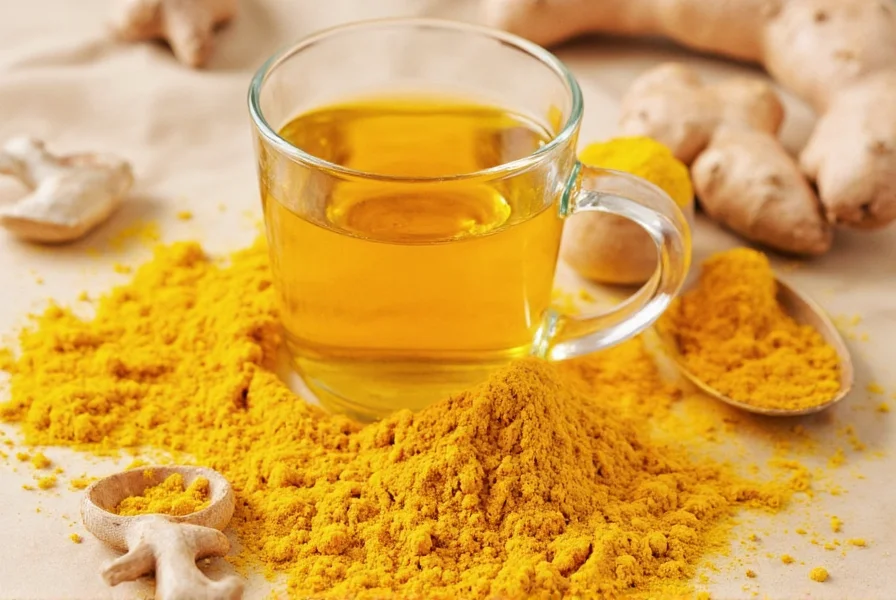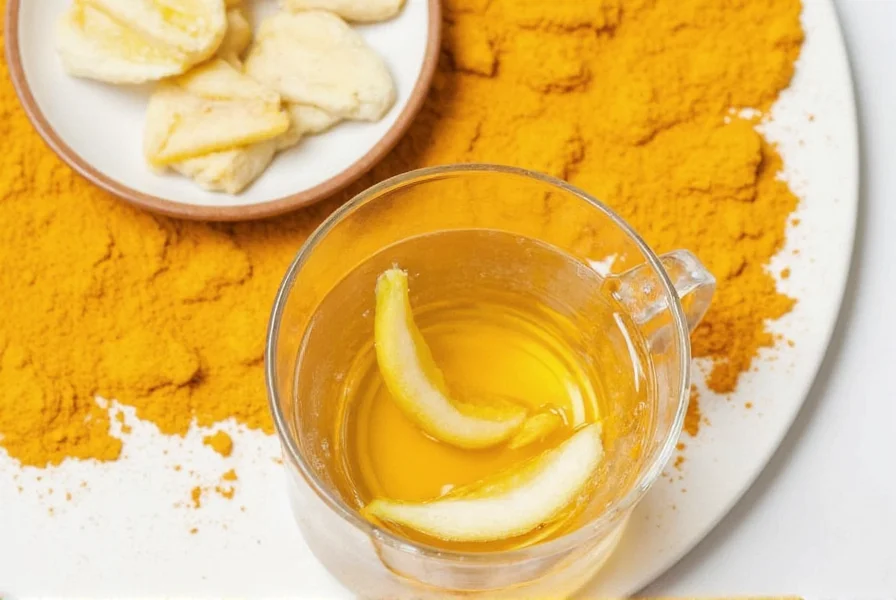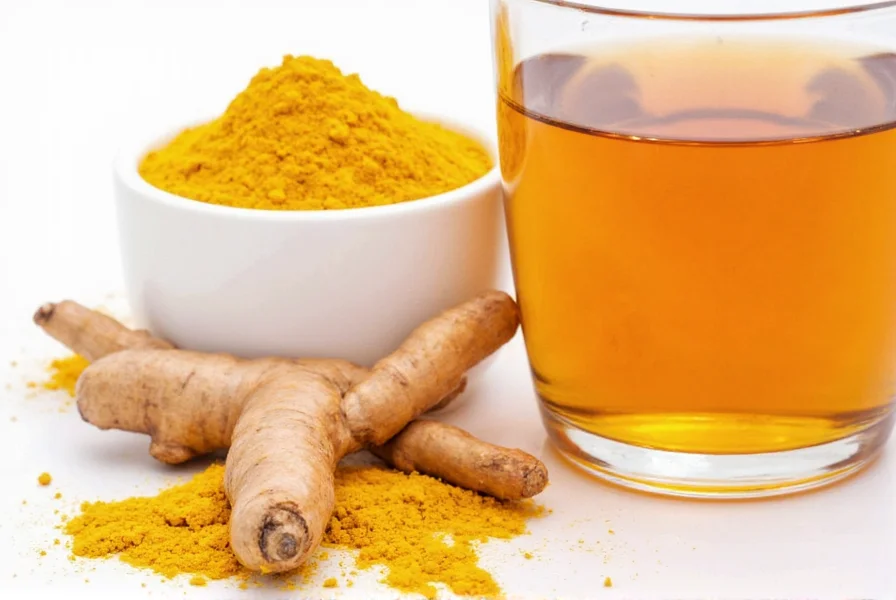Ginger tea with turmeric powder has gained popularity as a natural wellness beverage, blending ancient Ayurvedic and Traditional Chinese Medicine practices with modern health trends. This vibrant golden tea combines the spicy warmth of ginger with the earthy notes of turmeric, creating both a comforting drink and a potential source of health-supporting compounds. Understanding the science behind this combination helps separate evidence-based benefits from wellness hype.
The Science Behind Ginger and Turmeric
Ginger (Zingiber officinale) contains gingerols, the active compounds responsible for its characteristic flavor and many of its studied effects. Turmeric (Curcuma longa) provides curcumin, which gives the spice its distinctive yellow color and has been the subject of extensive research. When combined in tea form, these ingredients may offer complementary benefits, though it's important to understand the limitations of what a simple tea preparation can deliver.
Research-Supported Health Benefits
Multiple studies have examined the individual components of this tea combination. Ginger has demonstrated potential for supporting digestive health and reducing nausea. A 2020 review published in Nutrients highlighted ginger's anti-inflammatory properties and its role in managing oxidative stress. Turmeric's curcumin has been studied for its potential effects on inflammation pathways, with research suggesting it may help manage symptoms of osteoarthritis when consumed in sufficient quantities.
| Compound | Primary Benefits | Research Status |
|---|---|---|
| Gingerols (from ginger) | Digestive support, nausea reduction, anti-inflammatory | Strong evidence for digestive benefits |
| Curcumin (from turmeric) | Anti-inflammatory, antioxidant properties | Moderate evidence, enhanced with black pepper |
It's crucial to note that most clinical studies use concentrated extracts rather than tea preparations. The bioavailability of curcumin significantly increases when combined with piperine from black pepper, which is why many traditional preparations include this addition.
How to Prepare Effective Ginger Turmeric Tea
Creating an effective ginger tea with turmeric powder requires attention to preparation methods that maximize the availability of active compounds:
- Use 1-2 inches of fresh ginger root, thinly sliced or grated
- Add 1/2 to 1 teaspoon of turmeric powder
- Simmer in 2 cups of water for 10-15 minutes (not boiling)
- Add a pinch of black pepper to enhance curcumin absorption
- Optionally include healthy fats like coconut milk to further increase absorption
- Strain and add lemon or raw honey to taste

The optimal preparation time balances extraction of beneficial compounds with avoiding degradation from excessive heat. Longer simmering times (beyond 20 minutes) may actually reduce certain beneficial compounds while extracting more bitter elements.
Realistic Expectations for Health Benefits
While ginger tea with turmeric powder offers potential health benefits, it's essential to maintain realistic expectations. Regular consumption as part of a balanced diet may contribute to overall wellness, but it shouldn't replace medical treatment for specific conditions. The concentration of active compounds in homemade tea is significantly lower than in clinical studies using standardized extracts.
For those seeking anti-inflammatory ginger turmeric tea benefits for specific health concerns, consult with a healthcare provider about appropriate therapeutic approaches. The tea works best as a complementary wellness practice rather than a standalone treatment.
Safety Considerations and Potential Interactions
Ginger tea with turmeric powder is generally safe for most people when consumed in culinary amounts. However, certain individuals should exercise caution:
- People taking blood thinners should consult their doctor, as both ginger and turmeric have mild anticoagulant properties
- Those with gallbladder issues should be cautious with turmeric
- Pregnant women should limit ginger intake to moderate amounts
- Individuals with gastroesophageal reflux disease (GERD) may experience symptom exacerbation
The recommended daily intake for general wellness is 1-3 cups. Consuming excessive amounts (more than 4-5 cups daily) could potentially cause digestive discomfort or other side effects.
Maximizing Benefits Through Proper Consumption
To get the most from your turmeric ginger tea for digestion and overall wellness:
- Consume shortly after meals to support digestion
- Include a source of healthy fat (like a small amount of coconut milk) to increase curcumin absorption
- Add black pepper consistently to enhance bioavailability
- Use fresh ginger rather than dried for higher gingerol content
- Store turmeric powder in a cool, dark place to preserve potency

Consistency matters more than intensity when incorporating this tea into your wellness routine. Daily moderate consumption provides more sustainable benefits than occasional large servings.
Traditional Uses and Modern Adaptations
The combination of ginger and turmeric has roots in multiple traditional medicine systems. In Ayurveda, this pairing supports agni (digestive fire), while Traditional Chinese Medicine values ginger for its warming properties. Modern adaptations have refined preparation methods based on scientific understanding of compound bioavailability.
When preparing homemade ginger tea with turmeric powder for inflammation support, consider these evidence-informed adaptations to traditional recipes. The addition of black pepper represents a perfect fusion of traditional wisdom and modern scientific understanding.
Frequently Asked Questions
How often should I drink ginger turmeric tea for optimal benefits?
For general wellness, 1-3 cups daily is considered safe and potentially beneficial. Consuming the tea after meals may enhance digestive benefits. Those using it for specific wellness goals should maintain consistent daily consumption rather than occasional large servings.
Can I use fresh turmeric instead of powder in my ginger tea?
Yes, fresh turmeric root can be used instead of powder. Grate about 1-2 inches of fresh turmeric root and simmer with ginger. Fresh turmeric contains turmerone compounds that may offer additional benefits, though the curcumin concentration is similar to powdered form. Fresh ingredients generally provide more volatile compounds that can be lost in processing.
Does ginger tea with turmeric help with weight loss?
While ginger tea with turmeric powder isn't a weight loss solution, it may support metabolic health as part of a comprehensive approach. Some studies suggest ginger may modestly influence metabolism, and the tea can serve as a healthy alternative to sugary beverages. However, significant weight management requires dietary changes, physical activity, and potentially medical guidance.
When is the best time to drink ginger turmeric tea?
Morning consumption may provide an energizing start to the day, while drinking after meals supports digestion. Some people prefer evening consumption for relaxation, though those sensitive to ginger's stimulating effects might find it disruptive to sleep. For digestive benefits, consuming 10-15 minutes before or with meals shows the most consistent results in traditional practice.
How long does it take to notice benefits from regular consumption?
Individual responses vary, but most people report noticing subtle effects on digestion and general wellness within 2-4 weeks of consistent daily consumption. Significant anti-inflammatory effects would likely require higher concentrations than typically found in tea preparations. Patience and consistency are key, as these natural compounds work cumulatively rather than providing immediate dramatic effects.











 浙公网安备
33010002000092号
浙公网安备
33010002000092号 浙B2-20120091-4
浙B2-20120091-4